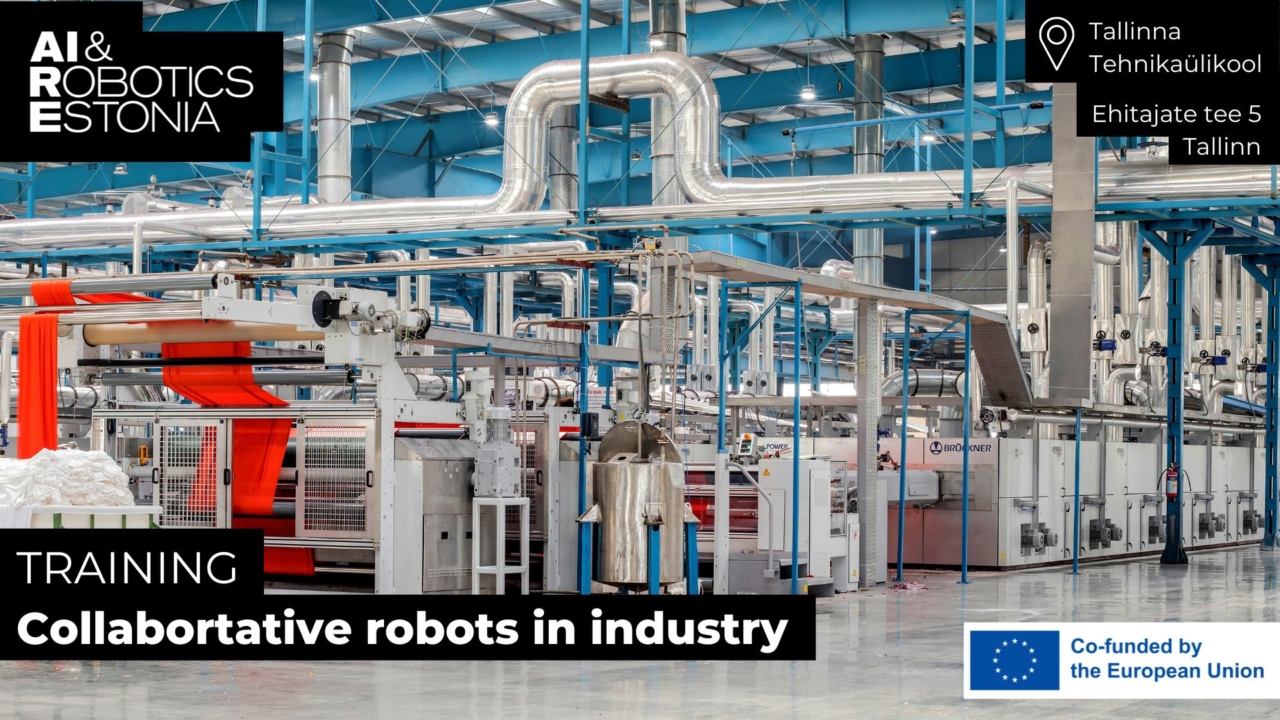The artificial intelligence and robotics center AIRE (EDIH) is co-financed by the European Union from the "European Digital Innovation Hubs" program (project number 101256226) and the Ministry of Economic Affairs and Communications.

Collaborative robots in industry
Shaping performance is important for every business. Today’s technological developments are extremely rapid, which makes it more difficult to make the right decisions. The need to increase productivity, flexibility and at the same time to be resource efficient has led to the rapid and large-scale emergence of collaborative robots (cobots) in manufacturing.
The aim of this training is to explain the nature and the use of collaborative robots (cobots) for different types of tasks. We will also carry out a process of designing different jobs to perform the required tasks and analyse the feasibility and necessity of the choices made, both from a technological point of view and from the point of view of performance design.
The main topics to be covered in the training are: the nature of collaborative robots, collaborative robots compared to industrial robots, the use of collaborative robots in different application areas. The nature and need for, and the feasibility of, the practical use of collaborative robots. Selection of collaborative robots and accessories. Design and use of a robotic workplace. Modern solutions to improve the performance of collaborative robots (e.g. digital twins, IoT, plug & produce, AI). The nature and key challenges of a collaborative robot deployment project, risk analysis and cost-benefit analysis.
TARGET AUDIENCE: Participation is primarily open to small and medium-sized manufacturing enterprises (EMTAK C). The course is aimed at managers of industrial enterprises, technical managers, production managers, development managers.
Time of happening: 13. March 2024
Time: 10.00 – 17.30
Place of happening: The training will take place in Tallinn and will be conducted in Estonian. Tallinn University of Technology, Ehitajate tee 5, Tallinn, room U05-302.
MAIN TOPICS:
- Developments in robotisation
- Collaborative robots vs industrial robots
- Applications of collaborative robots
- Choice of collaborative robots and accessories
- Robotised workplace design and operation
- The nature and key issues, risk analysis and cost-benefit analysis of an AI robot deployment project.
Successful completion of the training will give participants the knowledge to:
- The nature of collaborative robots
- The use of collaborative robots in different application areas
- Designing and using a collaborative workplace based on collaborative robots
- The nature of a collaborative robot deployment project
- Opportunities for performance improvement using collaborative robots
TIMETABLE:
Wednesday 13 March 2024
Day 1 – 8 Academic hours
- 10.00 – 10.10 Welcome and overview of the training day
- 10.10 – 10.45 Introduction. Developments in robotisation
- 10.45 – 11.30 Cooperative robots vs industrial robots.
- 11.30 – 11.45 Coffee break
- 11.45 – 12.30 Collaborative robot applications. The nature and need for practical application and feasibility.
- 13.30 – 13.15 Robot technology. Choice of collaborative robots and accessories.
- 13.15 – 14.00 Lunch
- 14.00 – 14.45 Robot technology. Selection of collaborative robots and accessories (continued). Examples
- 14.45 – 15.30 Design and use of robotised workstations.
- 15.30 – 15.45 Coffee break
- 15.45 – 16.30 Design and use of a robotic workstation.
- 16.30 – 17.15 Risk analysis and cost-benefit analysis
- 17.15 – 17.30 Summary
➠ Those who complete the training in full will receive an IMECC OÜ training certificate.
The deadline for registration is 12 March 2024.
For further information please contact Jüri Riives, 5010107 (substantive questions) or Kaia Lõun kaia.loun@imecc.ee (organisational questions) .
ABOUT THE LECTURER:
Jüri Riives (IMECC OÜ) is the founder of IMECC OÜ and a professor at Tallinn University of Technology. Jüri has been the Chairman of the Board of the Estonian Engineering Industry Association for a long time (1999-2009). Jüri has extensive entrepreneurial experience and is an expert in industrial robotics, digitalisation, cost-efficient manufacturing (including Lean) and industrial business model development.
The gateway to AIRE’s services is the company’s Digital Maturity Assessment (DMA) consulting service, which helps map your company’s strengths, bottlenecks and their impact on your business. For the first time, or if more than 1 year has passed since the previous digital maturity assessment, the AIRE target company will receive a DMA consultancy service from IMECC OÜ at a de minimis rate (€600) when registering for the training. After enrolment, the company will have access to the digital maturity assessment environment.
Pre-registration is essential for the training. The grant for participation in the training will be treated as de minimis aid (de minimis aid) for companies, amounting to €480 per participant.
Generally standard text in the notices. May be modified if the course is specifically targeted at a professional position or if prior knowledge at advanced level is essential.



